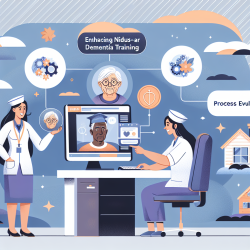Introduction
The recent study titled "A process evaluation of the NIDUS-Professional dementia training intervention for UK homecare workers" provides valuable insights into enhancing the skills of practitioners working with individuals with dementia. This evaluation was conducted alongside a randomized controlled trial to assess the feasibility and effectiveness of the NIDUS-Professional intervention, a remote training program for homecare workers (HCWs). The findings underscore the importance of structured training programs in improving care quality and practitioner confidence.
Key Findings
The study highlighted several critical outcomes:
- High Fidelity and Adherence: The intervention was delivered with high fidelity, and those who participated showed high adherence rates, with 89% of HCWs and 71% of family carers completing the program.
- Structural Challenges: Key barriers to implementation included staff shortages, heavy workloads, and the need for management buy-in. Agencies with greater management support had higher reach and dose of the intervention.
- Value of Peer Support: HCWs valued the opportunity for group reflection and peer support, which provided practical, actionable strategies and increased their confidence as practitioners.
Implications for Practitioners
For practitioners in speech-language pathology and related fields, the findings from the NIDUS-Professional evaluation offer several actionable insights:
- Emphasize Peer Learning: Facilitating environments where practitioners can engage in group reflection and peer support can enhance learning and application of new strategies.
- Address Structural Barriers: Identifying and addressing structural barriers, such as management buy-in and workload management, can improve the implementation and effectiveness of training programs.
- Focus on Practical Strategies: Training programs should provide practical, actionable strategies that practitioners can immediately apply in their work to improve client outcomes.
Encouragement for Further Research
The NIDUS-Professional evaluation underscores the need for continued research into sustainable training models that can be adapted to various settings, including online therapy services like those provided by TinyEYE. By exploring innovative training approaches and evaluating their effectiveness, practitioners can continue to improve care quality and outcomes for individuals with dementia and other communication disorders.
Conclusion
The NIDUS-Professional dementia training intervention demonstrates the potential for structured, remote training programs to enhance practitioner skills and improve care quality. By addressing structural barriers and emphasizing peer support and practical strategies, practitioners can achieve better outcomes for their clients.
To read the original research paper, please follow this link: A process evaluation of the NIDUS-Professional dementia training intervention for UK homecare workers.










